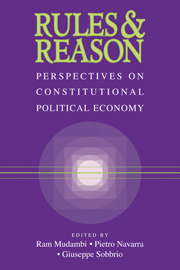Book contents
- Frontmatter
- Contents
- Foreword
- Preface and Acknowledgments
- List of Contributors
- 1 Constitutional Issues in Modern Democracies
- PART I CONSTITUTIONAL THEORY
- 2 On Writing a Constitution
- 3 Constitutional Order and Economic Evolution: Competitive and Protectionist Interests in Democratic Society
- 4 The Efficacy of Arbitrary Rules
- 5 Constitutional Political Economy and Civil Society
- 6 The Constitutional Conflict between Protecting Expectations and Moral Evolution
- 7 Ideological Competition and Institutions: Why “Cultural” Explanations of Development Patterns Are Not Nonsense
- PART II ELECTORAL SYSTEMS AND INSTITUTIONS
- PART III CONSTITUTIONAL ISSUES FOR A FEDERAL STATE
- Index
3 - Constitutional Order and Economic Evolution: Competitive and Protectionist Interests in Democratic Society
Published online by Cambridge University Press: 05 June 2012
- Frontmatter
- Contents
- Foreword
- Preface and Acknowledgments
- List of Contributors
- 1 Constitutional Issues in Modern Democracies
- PART I CONSTITUTIONAL THEORY
- 2 On Writing a Constitution
- 3 Constitutional Order and Economic Evolution: Competitive and Protectionist Interests in Democratic Society
- 4 The Efficacy of Arbitrary Rules
- 5 Constitutional Political Economy and Civil Society
- 6 The Constitutional Conflict between Protecting Expectations and Moral Evolution
- 7 Ideological Competition and Institutions: Why “Cultural” Explanations of Development Patterns Are Not Nonsense
- PART II ELECTORAL SYSTEMS AND INSTITUTIONS
- PART III CONSTITUTIONAL ISSUES FOR A FEDERAL STATE
- Index
Summary
Introduction
Economic systems exist in an environment, and they must, in one way or another, adapt to the conditions and changes in their environment. Their ability to function and survive depends on their adaptive capacity. This problem has existed throughout the ages for all economic systems. It has, however, without a doubt become especially topical in recent times through the accelerated economic integration worldwide and the increasing globalization of markets. Discussions, under headings such as “institutional sclerosis,” of the present difficulties that European welfare states encounter in a world of increasing global competition illustrate this fact.
The ability of economic systems to adapt to changes in their environment, and the manner in which such adaptation proceeds, critically depend on their economic constitution, that is, on the framework of rules and institutions that constrain actions and transactions of economic agents within a jurisdiction as well as their transactions with actors outside. External influences always affect an economic system through their impact on the behavior of persons within the respective jurisdiction. And what we describe as a system's adaptation to its environment is, in the final instance, always a matter of reactions of individual persons to changes in the environment – whether these reactions occur through separate individual responses or through organized collective choices, and whether they occur as adaptive responses on the sub-constitutional level or as changes in the economic constitution itself. Decisive for the adaptive capacity of an economic system are the ways in which its economic constitution channels the efforts of individual actors in their private as well as in their public political capacities.
- Type
- Chapter
- Information
- Rules and ReasonPerspectives on Constitutional Political Economy, pp. 33 - 55Publisher: Cambridge University PressPrint publication year: 2001
- 3
- Cited by

